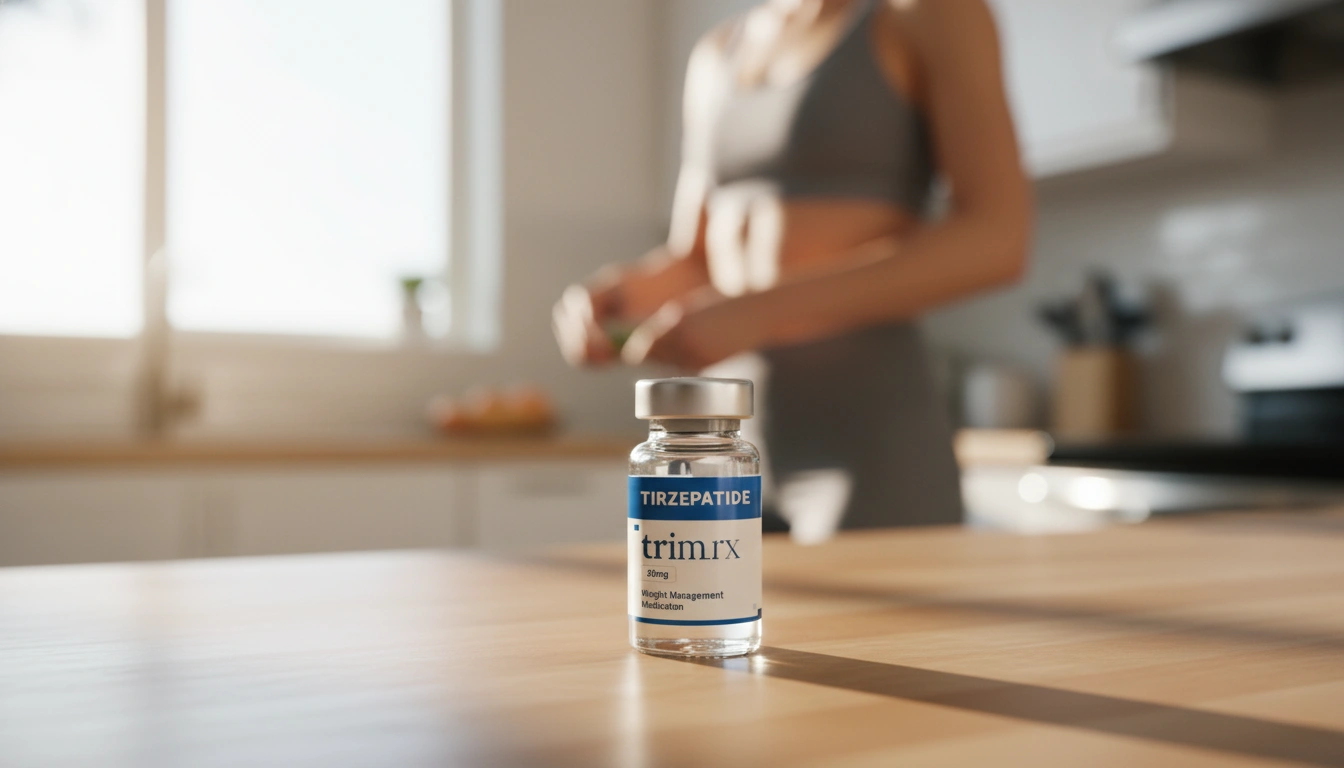Can You Take Tirzepatide While Breastfeeding? What You Need to Know

Introduction
Navigating the postpartum period brings a mix of joy, challenges, and an array of decisions—especially when it comes to your health and that of your baby. Among these decisions is the question: Can you take tirzepatide while breastfeeding? This question has become increasingly relevant as tirzepatide gains popularity as a medication for managing type 2 diabetes and supporting effective weight loss, including post-pregnancy weight management.
Tirzepatide (sold under brand names like Mounjaro® and Zepbound®) is a relatively new medication and part of a class of drugs that mimic natural hormones regulating blood sugar and appetite. While it offers promising benefits for many adults, its use during sensitive times like breastfeeding demands careful consideration.
In this post, we’ll explore what is known about tirzepatide and breastfeeding, analyze current research and expert advice, and provide guidance on making decisions with your healthcare provider. We’ll also help you understand how personalized weight loss support works and how you can safely approach your postpartum weight journey.
Together, we’ll explore the science behind tirzepatide’s effects, its potential impact on breast milk and infants, alternatives, and how you can receive individualized care that respects your unique health goals and lifestyle.
By the end, you’ll have a comprehensive understanding to discuss this topic confidently with your doctor and consider safe paths to your health goals.
Our discussion will cover:
- What tirzepatide is and how it works
- The essentials of medication use while breastfeeding
- The current evidence on tirzepatide’s safety during lactation
- Practical steps for new mothers considering tirzepatide
- How personalized telehealth weight loss programs can support your journey safely
Let’s dive in.
Understanding Tirzepatide: What Is It and How Does It Work?
Tirzepatide is a synthetic peptide medication that simultaneously targets two important receptors involved in glucose regulation: the Glucose-Dependent Insulinotropic Polypeptide receptor (GIP) and the Glucagon-Like Peptide-1 receptor (GLP-1). This dual-agonist action creates a powerful and effective response to help manage blood sugar levels in adults with type 2 diabetes and support weight loss.
Originally approved by the FDA as Mounjaro® for adults with type 2 diabetes, tirzepatide has more recently been authorized in forms like Zepbound® for chronic weight management alongside lifestyle changes such as diet and exercise.
How Tirzepatide Helps:
Tirzepatide works by stimulating insulin secretion when blood sugar is elevated, reducing appetite, slowing gastric emptying, and enhancing overall metabolic function. This combination helps reduce blood glucose and contributes to weight loss in many individuals.
The medication is administered by injection, usually once weekly, and is dosed carefully under medical supervision to optimize effectiveness and minimize side effects.
Why Tirzepatide is Popular Postpartum:
Post-pregnancy weight retention is a common challenge that may contribute to longer-term health issues such as diabetes and cardiovascular problems. Many postpartum women seek effective methods to safely shed excess weight, restore metabolic balance, and regain energy. Tirzepatide, with its clinically observed weight loss benefits, has attracted attention—yet its use during breastfeeding remains under close scrutiny.
Medication Use and Breastfeeding: Key Considerations
Before diving specifically into tirzepatide, it’s essential to understand the general principles guiding medication use during breastfeeding since the welfare of the infant is paramount.
How Drugs Can Affect Breastfed Infants
Many medications taken by a nursing mother can pass, to some extent, into breast milk and potentially reach the baby. The degree of exposure depends on various factors:
- Molecular size: Larger molecules are less likely to transfer into breast milk.
- Fat solubility: Fat-soluble drugs tend to accumulate more in milk.
- Protein binding: Drugs that bind tightly to blood proteins are less likely to pass into milk.
- Oral bioavailability in infants: Even if drugs reach milk, some are poorly absorbed orally by the infant’s gastrointestinal tract.
- Dose and timing: Medications taken immediately before or after feeding can vary infant exposure.
In addition to drug transfer, medications can affect milk supply or infant behavior indirectly.
The Need for Caution
Because infants, especially newborns and preterm babies, have immature metabolic and excretion pathways, drugs reaching their system can pose risks. For this reason, medications without extensive safety data typically warrant caution or avoidance during breastfeeding until more evidence emerges.
Healthcare providers weigh the benefits of continuing a medication against potential risks to the infant and the mother’s health.
When Does Medication Use During Breastfeeding Make Sense?
If a mother’s health condition requires treatment, and no safe alternatives exist, providers may advise continuing certain medications even during lactation with monitoring. Safe lactation promotes infant growth and maternal wellbeing so the full clinical context matters.
This tailored, patient-centric approach aligns exactly with our philosophy here at TrimRx: every individual’s journey is unique, and decisions should be based on science, empathy, and personalized care.
What Does the Research Say About Tirzepatide and Breastfeeding?
Currently, data on the use of tirzepatide specifically during breastfeeding is sparse but growing. Clinical trials evaluating tirzepatide excluded pregnant and breastfeeding women, a common practice to prevent unknown risks to infants.
Molecular Characteristics and Expected Milk Exposure
Tirzepatide is a large peptide molecule weighing approximately 4,814 Daltons. Due to its size and high protein binding, it is unlikely to pass into breast milk in significant amounts.
Moreover, peptides such as tirzepatide tend to degrade in the infant’s digestive tract, which reduces the chance of absorption into the infant’s bloodstream if ingested.
This theoretical understanding, based on pharmacokinetics, provides some reassurance but does not guarantee safety without human-specific clinical data.
Official Safety Information and Guidelines
Authoritative sources like the U.S. National Library of Medicine’s LactMed database state:
- No published clinical data is available on tirzepatide use in breastfeeding women or the effects on infants.
- Due to limited information, it is recommended to use tirzepatide with caution during lactation, especially when nursing newborns or preterm infants.
This cautious approach is standard until detailed research, clinical observations, or registries provide clearer safety profiles.
Anecdotal Reports and Emerging Experiences
Though clinical data is lacking, some breastfeeding mothers have shared their experiences with tirzepatide (Mounjaro® or Zepbound®), reporting no significant effects on infant health or milk supply at lower doses.
For example, in some cases, lactation was maintained successfully while on tirzepatide, with infants developing normally. However, some mothers noted changes in milk supply when doses reached higher levels.
These individual reports underscore the importance of medical supervision and close monitoring in these scenarios.
Potential Impact on Milk Supply
Since tirzepatide and similar GLP-1 agonists slow gastric emptying and affect appetite, they may theoretically influence milk production indirectly through nutritional or hormonal changes. However, no definitive evidence currently confirms any adverse effects on lactation.
Summary
- Tirzepatide’s large molecular size and metabolism make significant infant exposure through breast milk unlikely.
- No conclusive clinical data ensures safety during breastfeeding.
- Experts recommend cautious use and individualized risk-benefit assessment.
- Ongoing dialogue with healthcare providers is essential.
What Are the Risks and Benefits for Postpartum Mothers?
Health Risks of Untreated Conditions
For mothers with type 2 diabetes or obesity, delaying effective treatment post-pregnancy can pose health risks such as poor glucose control, cardiovascular strain, and higher rates of complications. Optimizing health benefits the mother and indirectly supports her ability to care for the infant.
Risks of Weight Loss Drugs During Breastfeeding
Weight loss itself, especially rapid or significant loss, is generally not encouraged during breastfeeding because adequate nutrition supports milk quality and supply. Since tirzepatide promotes weight loss, this factor must be considered when deciding on therapy timing.
Unexpected Pregnancy and Contraceptive Considerations
Notably, tirzepatide can alter the absorption of oral contraceptives, potentially increasing the risk of unexpected pregnancy. This interaction is critical for postpartum women relying on oral birth control to prevent another pregnancy soon after childbirth.
Balancing Priorities
If breastfeeding and using tirzepatide, mothers should work closely with their healthcare providers to:
- Monitor infant growth and development carefully
- Assess milk supply and make adjustments as needed
- Consider non-oral contraceptive methods during treatment
- Discuss the timing of tirzepatide initiation post-weaning if necessary
This balance emphasizes the importance of personalized medical guidance and ongoing support.
Practical Steps: How to Decide About Tirzepatide While Breastfeeding
Talk to Your Healthcare Provider
Your doctor or lactation consultant can help clarify the risks and benefits of starting or continuing tirzepatide while breastfeeding, considering factors like:
- Your health status and diabetes control
- The age and nutritional needs of your infant
- Your breastfeeding goals and whether you plan to continue nursing
- Potential alternatives that may be safer during lactation
Consider Timing
If possible, many providers recommend delaying tirzepatide initiation until after breastfeeding is complete to avoid any potential unknown risks and to support uninterrupted milk supply.
Monitor Closely
If tirzepatide use during breastfeeding is deemed necessary:
- Monitor infant weight gain, feeding behaviors, and overall health
- Watch for any changes in milk supply or maternal side effects
- Maintain open communication with your healthcare team
Explore Alternative Supports
If tirzepatide is not appropriate currently, other weight management and blood sugar control strategies can support your wellbeing postpartum. At TrimRx, we offer a personalized weight loss program that includes:
- Medical consultations tailored to your health profile
- Lab work and medication options, including GLP-1 daily support supplements that do not require a prescription quiz
- Unlimited support and education throughout your journey
Taking our free assessment quiz is a great first step to explore if you qualify for prescription medications like tirzepatide and receive a customized treatment plan:
Take the TrimRx Free Assessment Quiz
If immediate support is preferred, you can also explore our Quick-Access Supplements designed to enhance overall wellness during weight loss:
The Role of Personalized Telehealth in Safe Postpartum Weight Loss
Managing weight after pregnancy is a unique journey influenced by physical, hormonal, psychological, and lifestyle factors. At TrimRx, our approach blends advanced medical science with compassionate, individualized care, delivered through user-friendly telehealth platforms. Our personalized weight loss programs consider your specific circumstances—whether you are breastfeeding, managing diabetes, or navigating other health conditions.
Our services focus on:
- Transparent communication about your options and medical supervision
- Partnerships with FDA-registered pharmacies ensuring medication safety
- Comprehensive care including doctor consultations, lab work, ongoing support, and convenient shipping
- Respect for your lifestyle and family demands with flexible, accessible care
For mothers concerned about breastfeeding safety, our team collaborates closely with you and your healthcare providers to tailor a plan that supports both your health goals and your baby's wellbeing.
Again, we invite you to begin your journey by taking our free personalized assessment quiz here:
Start Your Personalized Weight Loss Program Today
Summary and Key Takeaways
- Tirzepatide is a highly effective medication used to manage type 2 diabetes and support weight loss but has limited human data regarding safety during breastfeeding.
- Its large molecular size suggests minimal transfer to breast milk and unlikely absorption by infants, though real-world safety data remain scarce.
- Caution is recommended when considering tirzepatide while nursing, especially with newborns or preterm babies.
- Breastfeeding mothers should consult healthcare providers to evaluate the risks and benefits based on personal health status and infant needs.
- Timing of therapy and monitoring infant health, milk supply, and maternal side effects are critical.
- Personalized telehealth programs like those offered by TrimRx provide a supportive, science-based approach to managing postpartum weight that respects individual needs and safety.
Are you currently breastfeeding and wondering if tirzepatide might be right for you? Taking the next step to understand your personalized profile can clarify your options.
Take the free assessment quiz now and partner with a medically supervised program designed for your success.
FAQ
Q1: Is tirzepatide safe to use while breastfeeding?
Currently, there is no definitive clinical evidence confirming the safety of tirzepatide during breastfeeding. Due to its large molecular size and metabolism, significant transfer into breast milk is unlikely, but caution is advised, particularly for newborns or preterm infants.
Q2: Can tirzepatide affect milk supply?
There is limited information on this. Some anecdotal reports suggest no major impact, but higher doses might influence supply. Close monitoring is essential.
Q3: How long after stopping tirzepatide should I wait before breastfeeding?
The drug’s half-life is approximately 5 days, and it may take 25 days or more to clear completely. Consult your healthcare provider for personalized timing based on your treatment course.
Q4: What should I do if I become pregnant while taking tirzepatide?
Weight loss medications including tirzepatide are generally not recommended during pregnancy. If you suspect pregnancy, contact your healthcare provider promptly to discuss discontinuing the medication and managing your health safely.
Q5: Are there weight loss support options that don’t interfere with breastfeeding?
Yes. At TrimRx, we offer quick-access supplements like GLP-1 Daily Support and Weight Loss Boost that can provide wellness support without prescription requirements. These can be used alongside lifestyle improvements during breastfeeding. Learn more here:
GLP-1 Daily Support | Weight Loss Boost
Every mother’s health journey is personal. If you’re considering tirzepatide or any weight loss medication during breastfeeding, partnering with healthcare professionals and personalized programs like ours at TrimRx ensures you receive care grounded in science, empathy, and safety.
Start by discovering your personalized options today: Take the TrimRx Free Assessment Quiz.
Together, we can support your path to a healthier, empowered you.

Transforming Lives, One Step at a Time
Keep reading
Navigating Your Path to Health: When Should You Increase Tirzepatide Dose?
Wondering when should you increase tirzepatide dose for weight loss? Learn the science behind dose escalation, typical schedules, and how to manage side effects for optimal results. Get personalized, medically supervised care with TrimRx.
Navigating Your Journey: When Should I Up My Dose of Tirzepatide for Optimal Weight Loss?
Wondering ‘when should I up my dose of tirzepatide’? Learn about dose escalation, signs it’s time to adjust, and managing side effects for effective weight loss. Get personalized guidance from TrimRx.
Tirzepatide Dosing: When to Go Up a Dose for Optimal Progress
Wondering when to go up a dose on tirzepatide? Learn the key signs, dosing schedule, and safety tips for optimal weight loss and minimal side effects.



